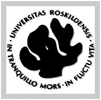| |
Presentation
Located a few kilometres to the east of the town of Roskilde and approximately
30 kilometres west of the Danish capital, Copenhagen, the University is
the daily place of work for around 8000 students, 700 researchers and
lecturers as well as 250 technical/administrative staff in the 50 buildings
which comprise the campus. The University has its own printing press,
which provides for the printing of everything from project reports and
research reports to RUCNyt; the official newspaper of the University,
issued every month.
A BRIEF HISTORY OF THE FEDERICO CAFFÈ CENTRE
The Federico Caffè Centre for Southern European Studies at Roskilde
University Centre was created in 1974 as a research section of the Institute
of Economics and Planning. Today it is the only Danish (and Scandinavian)
institution specialized in research and teaching activities in this area
of studies. Since then the activities of the Centre developed and specialized
in globalization and comparative regional studies. Presently the Centre
co-operates with more than 100 universities in Western Europe, Scandinavia,
Central and Eastern Europe, North Africa and Middle East, South East and
East Asia, Latin America, through a network system which involves both
departments, research centres and single scholars.
Federico Caffè, Professor of Political Economy at the University
of Rome "La Sapienza", is one of the major exponents of J. M.
Keynes' thought in Italy. He retired from his academic activities in 1987.
His legacy lies in the numerous books and articles on economic theory
and the welfare state still used in the Italian universities by generations
of students of economics. Federico Caffè has visited and lectured
in Denmark at Roskilde and Copenhagen Universities.
The Centre is specialised in research on issues such as comparative welfare
systems and industrial relations in Europe, the dynamic of the processes
of regional integration, in particular in Asia, Latin America and the
Euro-Mediterranean region, and the implications of the process of globalisation
of the economy and technology on the local production systems.
The Centre coordinates post-graduates training courses for Latin American
and European students in Innovation, Regional Integration and Globalisation
studies.
|
